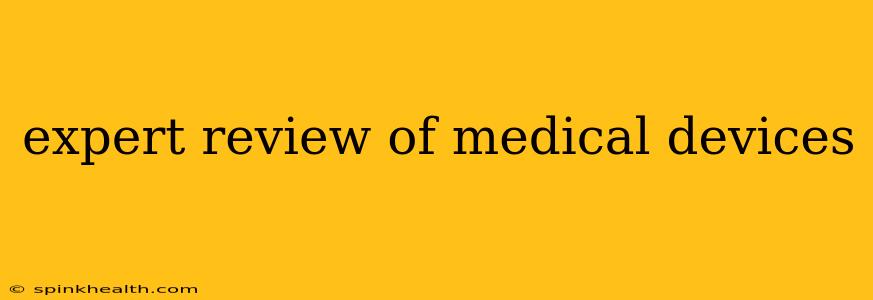The whirring of a sophisticated medical device, the subtle beep of a life-sustaining monitor, the precise incision of a robotic surgical tool – these are all testaments to the incredible advancements in medical technology. But behind these advancements lies a crucial process: the expert review of medical devices. This isn't simply a formality; it's a critical safeguard ensuring patient safety and the efficacy of these life-altering technologies. This in-depth review delves into the intricacies of this process, exploring the multifaceted roles and responsibilities involved in bringing safe and effective medical devices to market.
What is Involved in the Expert Review Process?
The expert review of medical devices is a rigorous multi-stage process, far from a simple "yes" or "no." It involves a detailed examination of every aspect of the device, from its design and manufacturing to its intended use and potential risks. Think of it as a rigorous interrogation of the device, ensuring it meets the highest standards of safety and performance.
This process usually involves:
-
Pre-market review: Before a new medical device can be sold, it undergoes a stringent evaluation by regulatory bodies like the FDA (in the US) or the EMA (in Europe). This involves a comprehensive review of pre-clinical data (animal studies, etc.) and clinical data (human trials). Experts scrutinize the device's design, materials, manufacturing processes, and performance.
-
Post-market surveillance: Even after a device is approved, the monitoring doesn't end. Ongoing surveillance tracks its performance in the real world, identifying any potential issues or adverse events that weren't detected during pre-market review. This continuous vigilance is crucial for catching and addressing any unforeseen problems.
-
Expert panels and consultations: Regulatory bodies frequently rely on expert panels composed of medical professionals, engineers, and statisticians. These panels provide independent assessments of the device's safety and efficacy, offering crucial insights and recommendations.
What Types of Experts are Involved?
The expertise required for comprehensive medical device review is incredibly diverse. It’s not just about doctors; it demands a multidisciplinary approach, incorporating:
-
Medical Doctors (various specialties): Their expertise is crucial in assessing the clinical implications, evaluating the device’s effectiveness in treating specific conditions, and identifying potential risks to patients.
-
Biomedical Engineers: These engineers play a vital role in assessing the device's design, materials, and manufacturing processes, ensuring its safety, reliability, and biocompatibility.
-
Statisticians: They are essential in analyzing clinical trial data, ensuring the results are statistically significant and reliable. Their expertise helps determine whether the device truly works as claimed.
-
Regulatory Affairs Specialists: These experts navigate the complex regulatory landscape, ensuring the device meets all the necessary requirements for approval and market access.
-
Toxicologists and Pharmacologists: These specialists are often involved in assessing potential adverse effects from the device and its materials on the human body.
How are Medical Device Reviews Different from Other Product Reviews?
The review of medical devices is far more rigorous and complex than that of most other products. The stakes are far higher. A faulty toaster can cause inconvenience; a faulty medical device can cause serious injury or even death. This distinction mandates:
-
Higher standards of evidence: Manufacturers must provide substantial clinical evidence demonstrating the device's safety and efficacy. This usually involves extensive clinical trials and rigorous testing.
-
More stringent regulatory oversight: Medical devices are subjected to strict regulations and oversight by governmental bodies, ensuring that manufacturers adhere to safety standards.
-
Emphasis on risk management: A thorough risk assessment is a central component of the review process. Manufacturers must identify and mitigate potential risks associated with the device's use.
What are the Key Challenges in Medical Device Reviews?
Despite the rigorous processes, challenges remain:
-
Keeping pace with technological advancements: The rapid pace of technological change in medical devices requires constant adaptation of the review process to ensure it remains relevant and effective.
-
Balancing innovation and safety: The review process needs to encourage innovation while rigorously protecting patient safety. This involves finding a careful balance between accelerating access to new technologies and avoiding premature release of untested devices.
-
Managing the growing volume of data: The volume of data involved in medical device reviews is enormous, requiring sophisticated tools and processes for effective analysis.
What is the Future of Medical Device Reviews?
The future of medical device reviews likely involves:
-
Increased reliance on real-world data: Post-market surveillance is expected to become even more critical, integrating real-world data from various sources to constantly monitor device performance.
-
Greater use of technology: AI and machine learning could be incorporated to enhance the efficiency and accuracy of the review process.
-
More global harmonization of regulations: This would streamline the approval process for medical devices, facilitating faster access to life-saving technologies globally.
The expert review of medical devices is a crucial gatekeeper, safeguarding patient safety and driving the responsible advancement of medical technology. It's a process that demands not only rigorous scrutiny but also a forward-thinking approach, continuously adapting to meet the evolving challenges of a rapidly changing field.

